Published
Summer Reading 2024 – Book Recommendations from ECIPE
By: Fredrik Erixon
Subjects: Agriculture Energy European Union Far-East North-America Regions Sectors

Every season is a time for reading but a long summer holiday is a particularly good time for relaxing with a good book. Here is a selection of books – some older, mostly newer ones – that ECIPE staff has recently read and can recommend.
What Went Wrong with Capitalism? By Ruchir Sharma
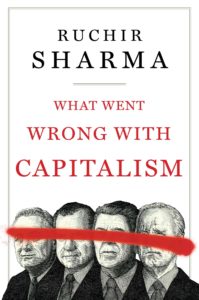 In his new book, Ruchir Sharma – an investor who writes a column in the Financial Times – takes stock of capitalism. He finds that it isn’t in good health. Western capitalism has ossified and far too many sectors have far too little competition. Zombie firms have multiplied and put a wet blanket on hopes to raise productivity across the economy. Sharma primarily blames capitalism’s poor health on vastly expanding governments. While folklore has it that we have been living through an age of economic liberalism, the reality is that the state interventions have expanded solidly in the last quarter century – if not longer. Now that both the US and the EU attempt to reenact the industrial policy of the 1970s, Sharma warns we should expect slower growth and more market concentration.
In his new book, Ruchir Sharma – an investor who writes a column in the Financial Times – takes stock of capitalism. He finds that it isn’t in good health. Western capitalism has ossified and far too many sectors have far too little competition. Zombie firms have multiplied and put a wet blanket on hopes to raise productivity across the economy. Sharma primarily blames capitalism’s poor health on vastly expanding governments. While folklore has it that we have been living through an age of economic liberalism, the reality is that the state interventions have expanded solidly in the last quarter century – if not longer. Now that both the US and the EU attempt to reenact the industrial policy of the 1970s, Sharma warns we should expect slower growth and more market concentration.
The Pursuit of Happiness by Jeffrey Rosen
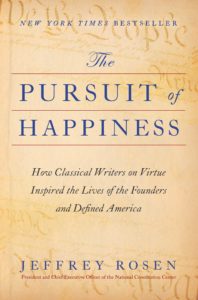 The U.S. Declaration of Independence famously states that we have the unalienable right to “life, liberty and the pursuit of happiness”. Life and liberty are clear and understandable concepts, but what does the pursuit of happiness actually mean? Indeed, what did the founders mean when they put it right at the heart of the American experiment? In this book, Law Professor Jeffrey Rosen has gone through the writings of the founders and studied what they read, and tracks the concept back to the Classics. There’s a Stoic origin to the pursuit of happiness, and John Adams, Benjamin Franklin, Thomas Jefferson and others didn’t exactly have a YOLO attitude to it. They drew up moral concepts for themselves (“imitate Jesus and Socrates”, Franklin added to his 13-point list of character building!) and considered virtue a necessary part of liberty.
The U.S. Declaration of Independence famously states that we have the unalienable right to “life, liberty and the pursuit of happiness”. Life and liberty are clear and understandable concepts, but what does the pursuit of happiness actually mean? Indeed, what did the founders mean when they put it right at the heart of the American experiment? In this book, Law Professor Jeffrey Rosen has gone through the writings of the founders and studied what they read, and tracks the concept back to the Classics. There’s a Stoic origin to the pursuit of happiness, and John Adams, Benjamin Franklin, Thomas Jefferson and others didn’t exactly have a YOLO attitude to it. They drew up moral concepts for themselves (“imitate Jesus and Socrates”, Franklin added to his 13-point list of character building!) and considered virtue a necessary part of liberty.
The Rise and Fall of the East: How Exams, Autocracy, Stability and Technology Brought China Success and why they might Lead to its Decline by Yasheng Huang
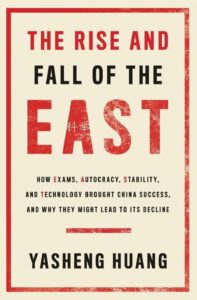 In this fascinating new book, MIT professor Yasheng Huang offers a counter point to those expecting continued economic and technological rise in China. He goes through China’s intellectual culture and it’s history, and shows that a focus on education have laid the foundation for China’s success. But the same culture can also breed conformity and risk aversion. Together with a renewed belief in autocratic governance, it leads to a resistance to new ideas and doing things in different ways. China, Huang warns, is redeveloping its old Keju model of imperial examination – the one that previously prompted a long period of technological decline.
In this fascinating new book, MIT professor Yasheng Huang offers a counter point to those expecting continued economic and technological rise in China. He goes through China’s intellectual culture and it’s history, and shows that a focus on education have laid the foundation for China’s success. But the same culture can also breed conformity and risk aversion. Together with a renewed belief in autocratic governance, it leads to a resistance to new ideas and doing things in different ways. China, Huang warns, is redeveloping its old Keju model of imperial examination – the one that previously prompted a long period of technological decline.
What If? Serious Scientific Answers to Absurd Hypothetical Questions by Randall Munroe
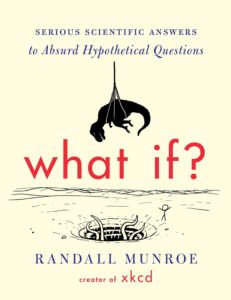 Have you ever wondered if you could live on a tiny, super-dense asteroid, just like the Little Prince? Perhaps not. But this wacky book, written by a real-life NASA veteran, takes you on a hilarious journey through the laws of science, answering those burning questions kids (and big kids – yes, you!) love to ask. It’s packed with memorable cartoons and witty answers, and it’ll have you learning without even realizing it.
Have you ever wondered if you could live on a tiny, super-dense asteroid, just like the Little Prince? Perhaps not. But this wacky book, written by a real-life NASA veteran, takes you on a hilarious journey through the laws of science, answering those burning questions kids (and big kids – yes, you!) love to ask. It’s packed with memorable cartoons and witty answers, and it’ll have you learning without even realizing it.
The New Map: Energy, Climate, and the Clash of Nations by Daniel Yergin
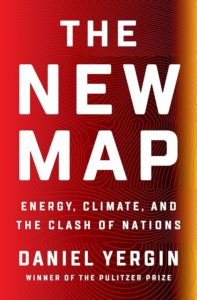 Daniel Yergin provides a thorough cartography of past and current geopolitical relations taking energy as the focal point. From the European dependence on Russian energy to the revolution of shale oil and gas propelling the US as the leading energy producer, the narrative is rich in details and historical perspectives. Throughout the book we rediscover geopolitical events and consequences that help explain today’s equilibrium between dependence and power – and how this could change. Ultimately, Yergin takes a shot at depicting a changing world in the face of climate change, and how new technologies can alter the balance of power based on fossil energy.
Daniel Yergin provides a thorough cartography of past and current geopolitical relations taking energy as the focal point. From the European dependence on Russian energy to the revolution of shale oil and gas propelling the US as the leading energy producer, the narrative is rich in details and historical perspectives. Throughout the book we rediscover geopolitical events and consequences that help explain today’s equilibrium between dependence and power – and how this could change. Ultimately, Yergin takes a shot at depicting a changing world in the face of climate change, and how new technologies can alter the balance of power based on fossil energy.
Comment Sauver les Animaux ? Une Économie de la Condition Animale by Romain Espinosa
 Espinosa, an economics researcher, offers an insightful and accessible analysis of animal welfare issues. Using behavioural economics and his own research, he explores the psychological mechanisms behind consumer choices of animal products. Espinosa highlights cognitive biases such as sincere ignorance, cognitive dissonance, thinking systems 1 and 2, impure altruism, reactance, and loss aversion to explain the gap between public concern for animal welfare and their exploitation. The book elevates the debate by examining the roles of various stakeholders—states, associations, businesses, and political parties—through concepts like nudge, taxation, loss aversion, and moral license.
Espinosa, an economics researcher, offers an insightful and accessible analysis of animal welfare issues. Using behavioural economics and his own research, he explores the psychological mechanisms behind consumer choices of animal products. Espinosa highlights cognitive biases such as sincere ignorance, cognitive dissonance, thinking systems 1 and 2, impure altruism, reactance, and loss aversion to explain the gap between public concern for animal welfare and their exploitation. The book elevates the debate by examining the roles of various stakeholders—states, associations, businesses, and political parties—through concepts like nudge, taxation, loss aversion, and moral license.